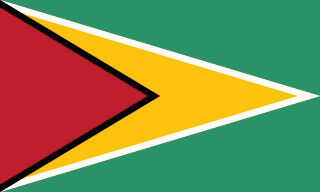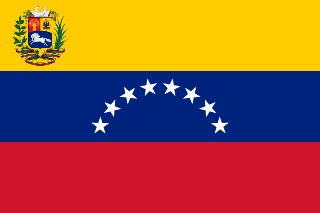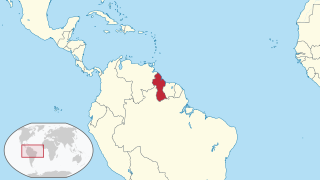External links
- Hindus of South America Hinduism Today - January 2000
- Plaisance market among five others to be rehabilitated Government of Guyana - October 22, 2005
Clinton Collymore was the Chief Minister within the Ministry of Local Government and Regional Development in Guyana. He is a convert to Hinduism.

Hinduism is a minority religion in South America, which is followed by even less than 1% of the total continent's population. Hinduism is found in several countries, but is strongest in the Indo-Caribbean populations of Guyana and Suriname. There are about 320,000 Hindus in South America, chiefly the descendants of Indian indentured laborers in the Guianas. There are about 185,000 Hindus in Guyana, 120,000 in Suriname, and some others in French Guiana. In Guyana and Suriname, Hindus form the second largest religion and in some regions and districts, Hindus form the majority. Though in recent times, due to influence of Hindu culture the number of Hindus converts have increased in other countries in South America, including Brazil, Argentina, Venezuela and others.

Islam is the third largest religion in Guyana, after Christianity and Hinduism, respectively. According to the 2012 census, 7% of the country’s population is Muslim. However, a Pew Research survey from 2010 estimates that 6.4% of the country is Muslim. Islam was first introduced to Guyana via enslaved people from West Africa, but was suppressed on plantations until Muslims from British India were brought to the country as indentured labour. The current President of Guyana, Mohamed Irfaan Ali is the first Muslim president.

Hinduism is the leading single religion of the Indo-Caribbean communities of the West Indies. Hindus are particularly well represented in Guyana, Suriname and Trinidad and Tobago. The Cayman Islands also hosts a sizable Hindu population, with 2.4 percent of the country affiliating with the religion. Smaller groups of Indo-Caribbeans live elsewhere in the Caribbean, especially Puerto Rico, Jamaica, Belize, Barbados, Saint Vincent and the Grenadines, Saint Lucia, and Bahamas.

Hinduism in Trinidad and Tobago is the second largest religion. Hindu culture arrived to Trinidad and Tobago in 1845, with the arrival of the first Indian indentured laborers, the overwhelming majority of which were Hindu. According to the 2011 census there were 240,100 declared Hindus in Trinidad and Tobago.

Karuppusamy, also known as Karuppu or Karuppannaswamy is a Tamil god in Tamil Nadu, popular among the social groups of Tamil Nadu and Kerala and also Sri Lanka. He is one of 21 guardian deities of Ayyanar, and is one of 21 guardian deities in Dravidian folk religion.

The following outline is provided as an overview of and topical guide to Guyana:

The following outline is provided as an overview of and topical guide to Venezuela:
Indo-Belizeans, also known as East Indian Belizeans, are citizens of Belize of Indian ancestry. The community made up 3.9% of the population of Belize in 2010. They are part of the wider Indo-Caribbean community, which itself is a part of the global Indian diaspora.
The Constitution of Guyana provides for freedom of religion.

Religion in Guyana is dominated by various branches of Christianity, with significant minorities of the adherents of Hinduism and Islam.

Guyana, officially the Co-operative Republic of Guyana, is a country on the northern coast of South America, part of the historic mainland British West Indies. Guyana is an indigenous word which means "Land of Many Waters". Georgetown is the capital of Guyana and is also the country's largest city. Guyana is bordered by the Atlantic Ocean to the north, Brazil to the south and southwest, Venezuela to the west, and Suriname to the east. With a land area of 214,969 km2 (83,000 sq mi), Guyana is the third-smallest sovereign state by area in mainland South America after Uruguay and Suriname, and is the second-least populous sovereign state in South America after Suriname; it is also one of the least densely populated countries on Earth. The official language of the country is English, although a large part of the population is bilingual in English and the indigenous languages. It has a wide variety of natural habitats and very high biodiversity. The country also hosts a part of the Amazon rainforest, the largest tropical rainforest in the world.

The following is an alphabetical list of topics related to the Co-operative Republic of Guyana.
Indians in Venezuela form one of the smaller populations of the Indian diaspora. According to the Indian Ministry of External Affairs (IMEA), among the approximately 690 East Indians living in Venezuela, 400 were Venezuelans of East Indian origin, 280 were Indian citizens and 10 were stateless residents. However, unofficial records put the Indo-Caribbean community from Guyana, Suriname, Jamaica and Trinidad and Tobago over 50,000.

Rama Navami is a Hindu festival that celebrates the birth of Rama, one of the most popularly revered deities in Hinduism, also known as the seventh avatar of Vishnu. He is often held as an emblem within Hinduism for being an ideal king and human through his righteousness, good conduct and virtue. The festival falls on the ninth day of the bright half of the lunar cycle of Chaitra (March–April), the first month in the Hindu calendar. It is also part of the Chaitra Navaratri festival in spring. Rama Navami is a holiday for government employees in India.
Soesdyke is a village in the Demerara-Mahaica Region, Guyana, located between the Demerara River and the East Bank Public Road. Soesdyke is located just after the village called Den Heuvel (Coverden) if you are coming from Georgetown, which is the capital of Guyana. On the other end of Soesdyke is the village Timehri about 3 miles northeast of the Cheddi Jagan International Airport.

Hinduism in Suriname is the second-largest religion. According to ARDA, there are 129,440 Hindus in Suriname as of 2015, constituting 23.15% of the population. Suriname has the second largest percentage of Hindus in the Western Hemisphere, after Guyana (24.8%).
Hinduism in Panama is a minority religion. There are about 14,000 (0.32%) Hindus in Panama as of 2021.

Hinduism in Guyana is the religion of about 31% of the population in 2020. This makes Guyana the country with the highest percentage of Hindu residents in the Western Hemisphere.

Hinduism is a minority religion in Jamaica, followed mainly by the Indo-Jamaicans. According to the 2011 census, Hinduism is followed by 0.07% of the population of Jamaica.

Hinduism is a minority faith in Brazil followed by approximately 0.01% of its population. Hinduism in Brazil is represented mainly by Ananda Marga, Brahma Kumaris and the Osho Institute Brazil, ISKCON, Yoga In Bound, Brasil Gaudiya Math and Sri Chaitanya Saraswat Math e Organização Vrinda de Paramadweit. The vedic astrology is also becoming popular due to Academia Brasileira de Astrologia Védica.